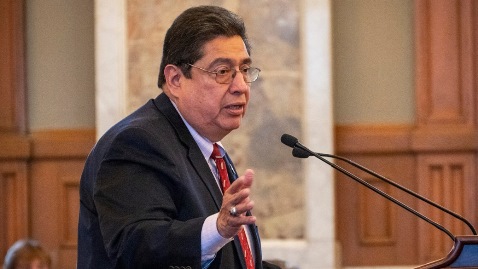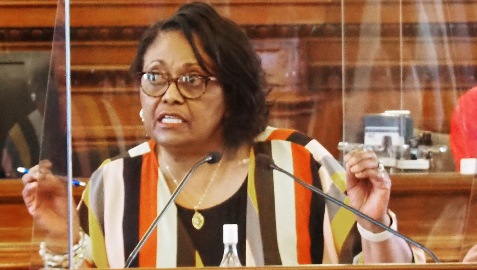
by Noah Taborda, Kansas Reflector
Topeka — The Kansas House is approving a measure that would prohibit “sanctuary cities,” areas where the municipal governments have rules blocking cooperation with federal authorities investigating undocumented immigrants.
The initiative, initiated by Attorney General Derek Schmidt, is a response to action taken by the Unified Government of Kansas City, Kansas – Wyandotte County to authorize municipal photo identification cards for undocumented people to improve access to public services. Dubbed the Safe and Welcoming City Act, the ID information collected would not be shared with U.S. Immigration and Customs Enforcement.
Opponents of the bill were an overwhelming majority during a hearing in the House Federal and State Affairs Committee last week, and Rep Luis Ruiz, who represents part of Wyandotte County, echoed many of the same critiques. He said the bill was short-sighted and would undermine local authority and instill fear in communities.
The Kansas City, Kansas, Democrat noted that Immigration and Customs Enforcement detainers are not arrest warrants and that holding an immigrant for an excessive period could be considered unconstitutional.
“We see the war-torn people in basements or across the world that happens but that happens to the south of us as well. So, what do we do?” Ruiz said. “I see a lot of lapel pins in here that people like to wear to tout their faith, and I applaud you for that, but does our behavior reflect our values?”
House Bill 2717, which representatives approved 84 to 38, would render local units of government unable to adopt any ordinance that would interfere with any law enforcement cooperation in immigration enforcement actions.
As of 2021, 12 states have enacted state-level laws prohibiting or restricting sanctuary jurisdictions. The Kansas Legislature has considered legislation to prohibit sanctuary cities across the state on several occasions, but none has passed.
Law enforcement officials in Wyandotte County said they hadn’t joined ICE agents on immigration raids in years. Still, Rep. Patrick Penn repeated claims by the attorney general and the secretary of state that the measure would help protect the rights given to legal Kansas residents and help protect election security.
“There can’t be a ban for local law enforcement officers to be made conscientious objectors, to doing their duties as prescribed by law when they disagree with political figures in their local counties,” Rep. Penn said.
But some representatives opposing the bill said this raised concerns not just for undocumented immigrants but for mixed-status families.
“Our broken immigration system keeps everyone in the family in this gray area where they are afraid to go to the police or to access municipal services lest one of their family members get arrested or deported,” said Rep. Pam Curtis, a Kansas City, Kansas, Democrat.
Rep. John Alcala, D-Topeka, asked representatives to consider what a vote in favor of this legislation says to their constituents.
“I voted to shut down production on meatpacking plants to feed our state,” Rep. Alcala said. “I voted to shut down lodging and restaurants for the lack of employees. I voted to cripple our agriculture community and farmers. I voted to increase the financial burden on municipalities and our taxpayers.”
Kansas Reflector stories, www.kansasreflector.com, may be republished online or in print under Creative Commons license CC BY-NC-ND 4.0.

